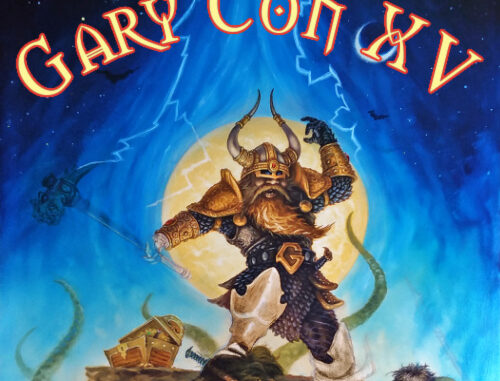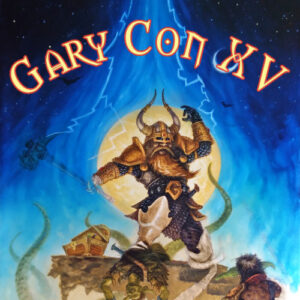
I ran three games at Virtual GaryCon this weekend and became aware of some things that Subconscious Garrett had known for a long time.
 For a convention, the attendees need to pay for travel, hotel rooms, food and a badge. This doesn’t include trips to the dealer hall. Hundreds if not thousands of dollars have been invested in the opportunity to play in your game.
For a convention, the attendees need to pay for travel, hotel rooms, food and a badge. This doesn’t include trips to the dealer hall. Hundreds if not thousands of dollars have been invested in the opportunity to play in your game.
Granted, I did a virtual convention, so the food and bed were covered, but five bucks had to be coughed up to get a badge to attend games. This in no way minimizes the efforts we as Game Masters should undertake to provide the best return on the investment.
For a long time I operated under the philosophy that the story that takes place during a convention game needs to be the biggest and most exciting adventure the Player Characters ever experienced. For running Star Trek Adventures, if this was media it would not be a standard episode of the week but would be a feature film shown in IMAX.
We need to go big. We need to pull out all the bells and whistles. In Star Trek, the characters should expect to go up against someone as legendary as Khan. For my convention game Every Day is a Winding Hyperspace Lane, the main villain is a clone of Keith Richards (yes, of the Rolling Stones), but I gave him Khan’s stat block.
This doesn’t just apply to our scenario design for convention games but needs to be applied to our execution of the games, and that’s what I learned this weekend. I ran a One Ring 2e session and a Conan: Adventures in an Age Undreamt Of game.
For the One Ring, there was a scene where the group was doing a rather standard three day journey between Dale and Esgaroth. This could have been hand-waved, since it was so short, but a convention game is an opportunity to showcase the bells and whistles of a game. And the Journey mechanics, being a major part of the One Ring, deserved to be spotlighted.
The Travel roll was failed. I rolled on the random table for travel events and got Joyful Sight. Everyone gains a mechanical benefit that allows them to do better on a future roll.
Who or what could they have possibly seen after being on trial in Dale for starting a riot? This is Middle Earth. We need to go big. The scouting PC ascended a hill and saw a bearded man with a pointy hat sitting astride a magnificent horse. The stranger called out to the PC by name and said, “You look a bit tired. Anything I can do to help?”
The group met Gandalf, who knew all about them and their mission. He shared pipe weed as they made camp. He listened to their story and gave advice. Finally, he announced he was due to arrive someplace else and disappeared into the shadows.
After the game a player asked, “Was Gandalf written into the module?”
I told him he wasn’t, but what better character for a convention game to meet in a situation that should lift everyone’s spirits?
In the Conan game, there was a lengthy battle inside the lair of the Serpent People. Two of the characters were poisoned. One got poisoned by trying to heal the other poisoned character and got the poison on himself instead. There was a huge pile of treasure.
I gave them an amount it was worth in gold… but that’s boring. One of the things I love about the world of Conan is there’s such a rich history and sense of culture in all the nations. It would be more beneficial for the group to find a relic of a bygone age amongst the treasure horde. Besides, as I explained to the group, this let me break out the Random Treasure Generator from the sourcebook Ancient Ruins and Cursed Cities.
On this table, it requires five to six rolls to select the details of the relic, which is great to have the players do. Have them each roll a d20 as they participate in discovering the details of their treasure. They rolled up a golden ring from an ancient people (I chose the Atlanteans). Then the last person rolled the history behind the artifact and got: haunted.
One of the characters in the group was an oracle who could do some magic. I told her that once a scene she could make a Sorcery check to summon the ghost of an Atlantean warrior to aid her. Two scenes later, the group’s facing the evil sorceress they’ve been tasked to bring down.
What’s the oracle’s opening move? She rolls Sorcery and extends her ring-wearing finger, summoning an Atlantean warrior ghost to harass the evil sorceress. For the rest of the fight, the difficulty of all rolls made by the sorceress was increased because she had to contend with the ghost harassing her. It set the combat off on the right foot for the heroes.
Was the ghost-summoning ring in the adventure I wrote? Nope.
Did I want to give the player of the oracle something memorable to do, being a minor magic user in a gritty sword and sorcery game? I sure did.
That player will remember summoning the ghost. It made her feel even more useful… and more important, bad ass.
When we run Call of Cthulhu at a convention, the PC who tries to cast a spell from an ancient tome… failure should be dramatic. Animals in a square acre suddenly explode. Fire rains from the sky. This isn’t enough for a convention game.
Cthulhu should awaken and go on a rampage.
Throw away the rest of your adventure and wing it. You have a new story, one of the apocalypse. Tell that story, and watch the players’ eyes open wide with fear and excitement.
For campaigns, it’s all right for every session to be as good as a typical Marvel movie. But for a convention game, you had better be running End Game.
